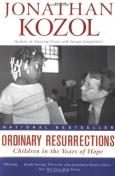BKMT READING GUIDES
Ordinary Resurrections: Children in the Years of Hope
by Jonathan Kozol
Paperback : 400 pages
1 club reading this now
0 members have read this book
Jonathan Kozol's books have become touchstones of the American conscience. In his most personal and optimistic book to date, Jonathan returns to the South Bronx to spend another four years with the children who have come to be his friends at P.S. 30 and St. Ann's. A fascinating ...
Introduction
Jonathan Kozol's books have become touchstones of the American conscience. In his most personal and optimistic book to date, Jonathan returns to the South Bronx to spend another four years with the children who have come to be his friends at P.S. 30 and St. Ann's. A fascinating narrative of daily urban life seem through the eyes of children, Ordinary Resurrections gives the human face to Northern segregation and provides a stirring testimony to the courage and resilience of the young.
Yet another classic of unblinking social observation from one of the finest writers ever to work in the genre, Ordinary Resurrections is a piercing discernment of right and wrong, of hope and despair -- from our nations's corridors of power to its poorest city streets.
Stepping back from his 30-year attack on the inequalities of education, Jonathan Kozol allows the children to speak for themselves in Ordinary Resurrections. These are the schoolchildren of South Bronx's most dismal neighborhood, Mott Haven, where social struggles with poverty and imprisoned fathers rate just under AIDS and asthma as the greatest threats to young lives. Yet, Kozol marvels, despair and bitterness don't come to mind when you meet 10-year-olds like Ariel, who "skips through life" and displays a healing tenderness to others at the church afterschool program that has become a living laboratory of sorts for Kozol since he wrote Savage Inequalities in 1996. This is "not the land of bad statistics but the land of licorice sticks and long division, candy bars and pencil sets," he writes. In recording conversations between these kids and each other, their teachers, caretakers, parents, and even himself, Kozol manages to move the adults to the periphery in order to let the children teach. There is no government data, no research conclusions, only a sense of hope and wonder at the resiliency of the young.
Kozol readily admits that he's due for a reflective moment. In his 60s, living alone, his parents seriously ill, he seeks safety in surrounding himself with children. He confesses that he's not a religious man, yet he finds himself overcoming his awkwardness with prayer, even bowing his head with the children at times. His writing in this moving account is among his most eloquent, as when he describes the gentle way in which a teacher tugs for the attention of a dreamy first-grader as if carefully unwrapping a small package that may be breakable. He captures the rhythm of the exchanges between teacher and student in a way that practically whispers to the reader. Ultimately, this is a book about healing that reveals more about the lives of children in poor neighborhoods--and Kozol--than any of his prizewinning books to date. --Jodi Mailander Farrell
Discussion Questions
No discussion questions at this time.Book Club Recommendations
Recommended to book clubs by 0 of 0 members.
Book Club HQ to over 90,000+ book clubs and ready to welcome yours.
Get free weekly updates on top club picks, book giveaways, author events and more








